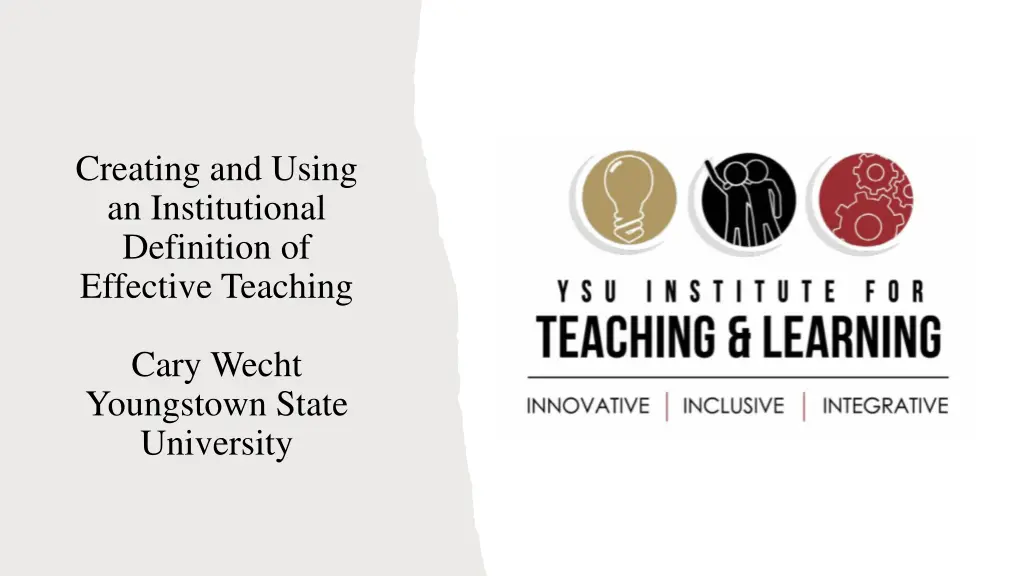
Institutional Definition of Effective Teaching Framework
Explore the development and implementation of an institutional definition of effective teaching at Youngstown State University, including the role of committees, evaluation methods, and principles such as transparency and evidence-based practices. Learn about the TEACH framework and key elements like transparency, evidence-based strategies, and more.
Download Presentation

Please find below an Image/Link to download the presentation.
The content on the website is provided AS IS for your information and personal use only. It may not be sold, licensed, or shared on other websites without obtaining consent from the author. If you encounter any issues during the download, it is possible that the publisher has removed the file from their server.
You are allowed to download the files provided on this website for personal or commercial use, subject to the condition that they are used lawfully. All files are the property of their respective owners.
The content on the website is provided AS IS for your information and personal use only. It may not be sold, licensed, or shared on other websites without obtaining consent from the author.
E N D
Presentation Transcript
Creating and Using an Institutional Definition of Effective Teaching Cary Wecht Youngstown State University
Youngstown State University Academic Senate (New-ish) Committee on Teaching and The T&L Committee is responsible for: Supporting the mission of the Center for Teaching and Learning; Maintain and revise the faculty evaluation of teaching procedures; Make recommendations for faculty development and resources related to teaching; In accordance with the University Strategic Plan, provide advice and counsel on institutional learning outcomes and in relation to experiential learning. Learning
What is effective teaching? What is this in your institution? How do you know? Where is it codified? How do department chairs evaluate it? Observation? Portfolios? Student evals? Who develops student evals? When? How would you begin this process?
Principles of Effective Teaching Must Apply to Full- and Part-Time Faculty Teaching/Lab/Virtual Assistants Face to Face and Online Environments Different Disciplines Institutional Mission, Goal and Value Statements, Strategic Plan
Looked to the Literature Developed a draft framework (ours) TEACH: Transparent Evidence-Based Aspirational Communicative Humane
Transparent The teacher... Provides and follows the course syllabus Clearly defines grading and attendance policies Posts syllabus and grades Offers a clear and organized course structure (calendar, consistent expectations) Sets expectations for returning student work Connects course activities and learning goals Explains what success looks like (e.g., gives examples, rubrics)
Evidence-Based The teacher... Uses a variety of student-centered strategies Designs instruction to help students see connections to prior understanding Helps students apply metacognition to their learning
Aspirational The teacher... Participates in professional development related to teaching and learning Stays current in their field of study and its pedagogies Reflects on and continuously improves own teaching and materials Engages in course/dept. assessment of student learning Stays up to date on YSU teaching/classroom policies
Communicative The teacher... Is available during scheduled student support (office) hours Effectively presents information, and checks for and responds to student understanding Is approachable to students outside the classroom Gives regular and meaningful formative feedback Is an active listener and open to diverse viewpoints
Humane The teacher... Recognizes students lives impact their role as learners Relates subject matter to life outside the classroom Inspires and motivates students to learn Is encouraging, supportive, and approachable Believes that all students can succeed Is welcoming and accommodating to all students
Identified important constituents shopped it, edited. (for us) campus groups and individuals: Academic Senate Administrators Deans Department Chairs Faculty Student Government Union Leadership
TEACH was endorsed by the Academic Senate, is housed and maintained by our ITL served as a guide to redesigning the new "Student Course Feedback" process and items, implemented Fall 2024 the TEACH standards to inform our Common Syllabus, also hosted and updated by ITL used the TEACH document to (a) create Class Observation Forms for department chairpersons to evaluate teaching in face-to- face and online classes Organize ITL activities and workshops around the TEACH framework Cyberlearning and IT have incorporated TEACH into their training developing materials to assist everyone with interpreting data gathered from student course feedback Student Government, the Teaching and Learning Committee, and the Academic Standards Committee also used the framework to develop a "Reciprocal Responsibilities for Undergraduate Students and Instructors" document, which establishes baseline classroom expectations for students and instructors regarding syllabi, grades, communication, and technology
Teaching-Adjacent Practices: Who Else Could Benefit? Advising Coaching Student Life Campus Rec clwecht01@ysu.edu
